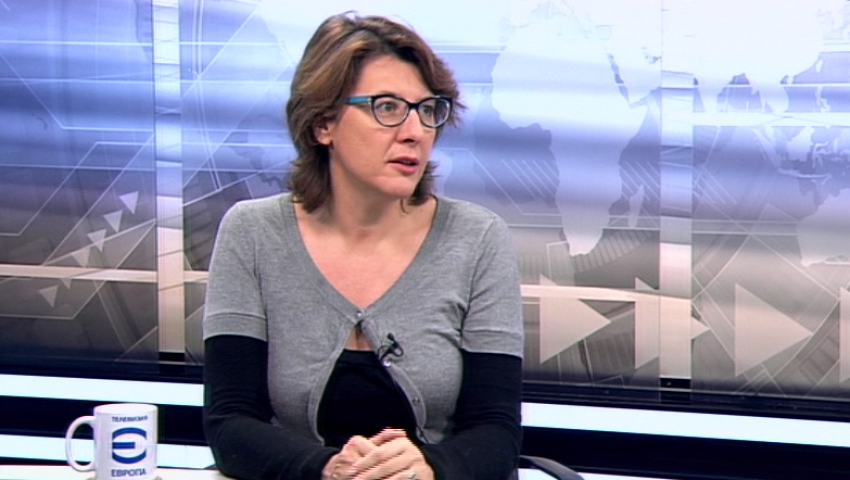Vessela Cherneva: The real gas diversification in Bulgaria can come with the construction of the interconnector with Greece

Bulgarian authorities do not want to listen to the warning of US Secretary of State Mike Pompeo regarding the expansion of the "Turkish Stream" through Bulgaria to Europe. This was stated by Vessela Cherneva from the European Council on Foreign Relations. Turkish Stream was discussed by the Assistant Secretary of State Francis Fannon and Energy Minister Temenuzhka Petkova. He made it clear that US sanctions would affect the continuation of Russia's Turkish Stream gas pipeline, despite the Bulgarian government names it the Balkan Stream.
"Even if the Bulgarian side is determined to build the Turkish Stream, it will neither ensure the diversification of gas supplies nor provide" blue fuel "for filling the Balkan gas hub," Cherneva said.
She also reminded that this pipeline, which will carry Russian gas, will be paid for by the Bulgarian taxpayers.
"If Bulgaria really wants to diversify gas supplies, the country should build the interconnector with Greece as soon as possible. "Many countries, including the United States, are pushing for this," she said.
The gas connection between the two countries has been talked about since 2009, 11 years later this short section has not been built yet.
"This is the best illustration of Russia's interest. The lack of this interconnector demonstrates the power of Gazprom in Bulgaria," Cherneva said.
Regarding the report of the European Commission, Cherneva noted that it is a much broader overview of what is happening in Bulgaria than the Mechanism for Cooperation and Verification, which was focused on certain areas.
"The report contains criticism of the Prosecutor General's lack of control, criticism of threats against the media, criticism of lobbying in the National Assembly, which is being celebrated for the first time. It is very difficult to say that this report is positive. Unfortunately, more and more Bulgaria is becoming part of the group of troubled countries, including Hungary and Poland. This is important for how our voice is heard," Cherneva stressed.
She also mentioned a recent article published in the authoritative German newspaper SPIEGEL about relations between the Bulgarian Prime Minister Boyko Borissov and the Turkish President Recep Tayyip Erdogan.
"The article in SPIEGEL is a good illustration of the fact that things that happen in Bulgaria cannot be hidden. No matter what we talk about, foreigners see the situation. We find the photos and recordings that appeared unflattering. Abroad, they look weird to the foreigners," Cherneva said.
She drew attention to the fact that for the first time in a long time in the Federal Republic, critical voices were heard against Bulgaria from both parties in Chancellor Angela Merkel's ruling coalition - the conservatives from the CDU/CSU and the GSDP. According to her, Bulgaria has not received such a strong criticism since the time when the government of the Socialists headed by Stanishev was in power more than 10 years ago.
The situation is complicated by the fact that in addition to the domestic political problems facing Bulgaria, it also faces foreign policy challenges. We are on the periphery of several conflicts, the most serious of which is the clash between Greece and Turkey in the Eastern Mediterranean, where significant natural gas reserves have recently been discovered.
"Bulgaria is in a very big arc of instability, at the center of which are currently Turkey and Greece. In this case, both the Turkish side and the Greek side are Sofia's partners on various issues. That is why the Bulgarian position is very difficult," Cherneva said.
According to her, the lack of any positioning of Bulgaria will become a problem over time, because we see that in the EU more and more countries led by France are taking action. She did not even rule out the imposition of sanctions by Brussels on Turkey if tensions escalate.
Referring to the US Secretary of State Mike Pompeo, who visited Greece earlier this week but did not go to Turkey, Cherneva said: "Relations between Washington and Ankara have deteriorated in recent months. Even the close personal relationship between Recep Tayyip Erdogan and Donald Trump, which they once flaunted, is not enough to clear up the security problem in the Eastern Mediterranean, which is very important for American strategic interests."
Vessela Cherneva is convinced that "Turkey's role as a troublemaker in the Eastern Mediterranean is not beneficial to anyone, including the United States. That's why we saw Secretary of State Mike Pompeo's visit to Greece this week. "
According to her, Erdogan is Turkey's most unpredictable leader in decades. "His neo-Ottoman line of reasoning is clear in many ways, both inside Turkey and in the Middle East," Cherneva said, adding: "For now, Turkey is a constructive player in the Balkans. This must be maintained so that Turkey does not turn on a dangerous direction."
